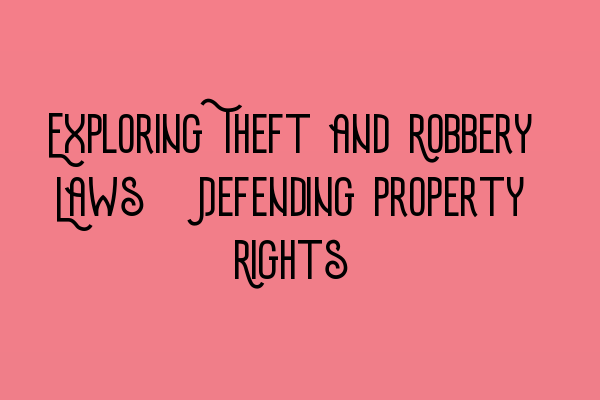Exploring Theft and Robbery Laws: Defending Property Rights
Property rights are fundamental to a functioning society, providing individuals with the ability to possess, use, and dispose of their own belongings as they see fit. However, theft and robbery pose significant threats to these rights, undermining the trust and security necessary for social and economic stability.
Understanding Theft and Robbery
In order to combat these crimes and protect property rights, the legal system enforces specific laws that criminalize theft and robbery. While often used interchangeably, theft and robbery are distinct offenses under criminal law.
Theft, as defined by the Theft Act 1968, involves the dishonest appropriation of another person’s property with the intention to permanently deprive them of it. This offense can range from simple acts of shoplifting to complex cases of embezzlement.
Robbery, on the other hand, combines theft with the use or threat of force against the victim. It involves taking someone’s property directly from their person or presence, using intimidation, violence, or coercion. Robbery is considered a more serious offense due to the added element of physical harm or the threat of it.
Defending Against Theft Charges
When faced with theft accusations, it is crucial to employ a skilled criminal defense solicitor who can develop a robust legal strategy to protect your rights and interests. By examining the specific circumstances of your case and reviewing the evidence against you, experienced solicitors can determine the best course of action.
If you find yourself wrongly accused of theft, an effective defense may involve challenging the prosecution’s evidence, questioning the intent to permanently deprive, or presenting evidence of mistaken identity. A strong defense emphasizes the lack of intent or the reasonable belief of lawful entitlement to the property in question.
Understanding the nuances of theft laws, such as the differences between theft, burglary, and handling stolen goods, is crucial for a successful defense. By working closely with a knowledgeable solicitor, you can navigate the complexities of the legal system and ensure the best possible outcome for your case.
For further insight into preparing for your legal career, consider exploring SQE 1 Practice Exam Questions and SQE 1 Practice Mocks FLK1 FLK2. These resources provide valuable practice and allow you to gauge your understanding of criminal law.
Defending Against Robbery Charges
Robbery charges can have severe consequences, ranging from imprisonment to significant fines. Being accused of robbery requires immediate action to protect your rights. A skilled criminal defense solicitor can build a solid defense for your case by carefully examining the evidence, interviewing witnesses, and challenging the prosecution’s case.
A successful defense against robbery charges often involves casting doubt on the prosecution’s evidence, challenging witness statements, and highlighting inconsistencies in the alleged victim’s identification. By skillfully presenting alternative narratives and emphasizing any lack of intent or presence at the scene, a dedicated solicitor can help secure a favorable outcome.
To further your knowledge and improve your legal expertise, consider enrolling in SQE 2 Preparation Courses and SQE 1 Preparation Courses. These comprehensive programs offer in-depth training and resources to enhance your understanding of criminal law and practice.
Stay up-to-date with the latest SQE exam dates and deadlines by visiting the SRA SQE Exam Dates page. Being aware of upcoming exams allows you to plan your studies effectively and maximize your chances of success.
Conclusion
Protecting property rights is paramount in a civilized society, and defending against theft and robbery charges requires competent legal representation. By consulting an experienced criminal defense solicitor and staying informed about the latest developments in criminal law, you can ensure your rights are upheld and secure the best possible outcome for your case.
